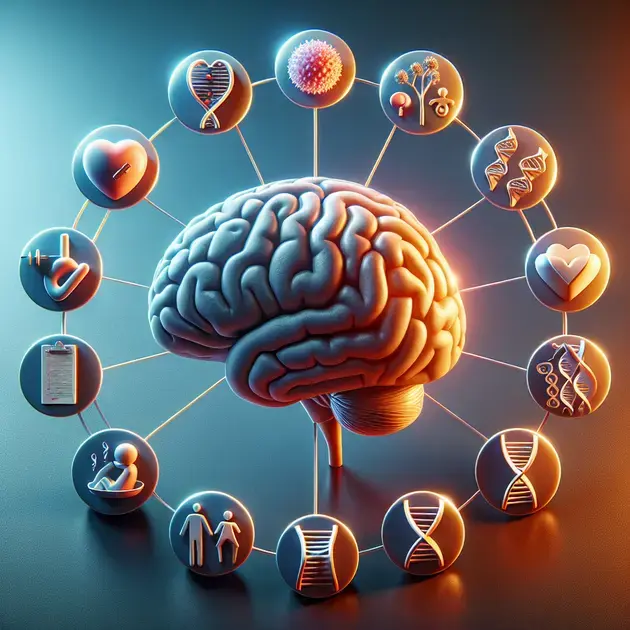Have you ever wondered about the complexities of cognitive impairment? In this comprehensive guide, we will delve into the various aspects of understanding cognitive impairment and its impact on individuals.
Recent studies have highlighted the importance of early detection and intervention when it comes to cognitive impairment. This guide aims to provide valuable insights and resources to help readers navigate through the complexities of this condition.

Understanding Cognitive Impairment: Exploring the Basics
Cognitive impairment refers to difficulties with cognitive functions such as memory, attention, language, and problem-solving. Understanding the basics of cognitive impairment is crucial for early detection and intervention. Here is a comprehensive guide to exploring the basics of cognitive impairment:
1. Definition and Causes
Start by defining cognitive impairment and its various causes. Websites like the National Institute on Aging (https://www.nia.nih.gov/) offer detailed information on the definition of cognitive impairment and the factors that can lead to its development, such as age-related changes, medical conditions, or brain injuries.
2. Types of Cognitive Impairment
Learn about the different types of cognitive impairment, including mild cognitive impairment (MCI) and various forms of dementia such as Alzheimer’s disease. Reliable sources like the Alzheimer’s Association (https://www.alz.org/) provide detailed explanations of each type and their unique characteristics.
3. Screening and Assessment
Understand the importance of screening and assessment for cognitive impairment. Online platforms like the Alzheimer’s Foundation of America (https://alzfdn.org/) offer resources on cognitive assessment tools and screening tests that can help identify cognitive issues early on.
4. Management and Treatment
Explore the different management and treatment options available for cognitive impairment. Websites like the Mayo Clinic (https://www.mayoclinic.org/) provide insights into lifestyle changes, medications, and therapies that can support cognitive function and overall well-being.
5. Support Systems
Discover the various support systems that exist for individuals with cognitive impairment and their caregivers. Platforms like the Caregiver Action Network (https://caregiveraction.org/) offer guidance on accessing support groups, financial assistance, and community resources to navigate the challenges of cognitive impairment.
Identifying Early Signs and Symptoms of Cognitive Impairment
Early detection of cognitive impairment is essential for timely intervention and management. Knowing the signs and symptoms can help individuals seek appropriate care. Here is a detailed guide on identifying early signs and symptoms of cognitive impairment:
1. Memory Loss
One of the most common early signs of cognitive impairment is persistent memory loss, especially forgetting recently learned information. Websites like the Alzheimer’s Society (https://www.alzheimers.org.uk/) provide insights into different memory-related symptoms and when to seek professional advice.
2. Confusion and Disorientation
Noticeable confusion, disorientation, and difficulty in following conversations or directions can indicate cognitive decline. Platforms like the Alzheimer’s Foundation of America (https://alzfdn.org/) offer resources on how to recognize these symptoms and take appropriate actions.
3. Impaired Communication
Struggling with communication, such as finding the right words or understanding complex sentences, can be an early indicator of cognitive impairment. Reliable sources like the National Institute on Aging (https://www.nia.nih.gov/) provide detailed information on communication challenges associated with cognitive decline.
4. Changes in Mood and Behavior
Keep an eye out for significant changes in mood, personality, or behavior, such as increased irritability or withdrawal from social activities. Websites like Mental Health America (https://www.mhanational.org/) offer resources on understanding behavioral changes related to cognitive impairment.
5. Functional Decline
Pay attention to any decline in the ability to perform daily tasks independently, such as managing finances or following a familiar recipe. Platforms like the Alzheimer’s Association (https://www.alz.org/) provide guidelines on assessing functional decline and seeking professional help when needed.

The Link Between Age and Cognitive Decline
As we age, our cognitive functions tend to decline naturally. This process is known as cognitive aging, and it is a normal part of the aging process. However, research has shown that there is a link between increasing age and a higher risk of cognitive decline, including conditions like dementia and Alzheimer’s disease. Factors such as changes in the brain’s structure and function, as well as decreased blood flow and hormonal changes, can contribute to cognitive decline in older adults.
Studies have also indicated that lifestyle factors play a significant role in the rate of cognitive decline associated with aging. Engaging in regular physical exercise, maintaining a healthy diet rich in antioxidants and omega-3 fatty acids, getting an adequate amount of sleep, and staying mentally active through activities like reading, puzzles, and social interactions can help slow down the cognitive aging process. Additionally, managing chronic conditions like hypertension, diabetes, and obesity can also contribute to maintaining cognitive function as we age.
It is essential for older adults to stay engaged socially and intellectually to help preserve cognitive function. Participating in activities that stimulate the brain, such as learning a new skill or language, can help build cognitive reserve and reduce the impact of aging on cognitive abilities. By staying physically, mentally, and socially active, older adults can mitigate the effects of age-related cognitive decline and enjoy a higher quality of life as they grow older.
Understanding the link between age and cognitive decline is crucial for implementing strategies to promote healthy brain aging. By adopting a proactive approach to brain health, individuals can take steps to reduce the impact of aging on cognitive function and maintain their cognitive abilities as they age.
Preventing Cognitive Impairment Through Lifestyle Changes
Cognitive impairment refers to a reduction in cognitive function that can impact memory, reasoning, and decision-making abilities. While cognitive decline is a natural part of aging, certain lifestyle changes can help prevent or slow down the progression of cognitive impairment. One such lifestyle change is adopting a healthy diet that includes foods rich in antioxidants, vitamins, and minerals.
Regular physical exercise has also been shown to have a positive impact on cognitive function. Exercise not only improves blood flow to the brain but also stimulates the growth of new neurons, which can help improve cognitive abilities. In addition to diet and exercise, getting an adequate amount of quality sleep is essential for maintaining cognitive function and overall brain health.
Engaging in activities that challenge the brain, such as puzzles, crosswords, or learning a new hobby, can help keep the mind sharp and prevent cognitive decline. Social interactions and staying connected with friends and family can also have a positive impact on cognitive function. By maintaining a healthy lifestyle that includes physical activity, mental stimulation, and social engagement, individuals can reduce their risk of cognitive impairment and enjoy a higher quality of life.
It is important to be proactive about brain health and take steps to prevent cognitive impairment as we age. By incorporating healthy habits into our daily routine and staying mentally and physically active, we can maintain cognitive function and preserve our cognitive abilities for years to come.
The Role of Genetics in Cognitive Impairment
Genetics play a significant role in determining an individual’s risk of developing cognitive impairment. Certain genetic factors can increase the likelihood of conditions like Alzheimer’s disease and other forms of dementia. While genetics cannot be changed, understanding one’s genetic predisposition can help individuals take proactive measures to reduce their risk of cognitive impairment.
Research has shown that certain genes are associated with an increased risk of cognitive decline and dementia. These genes can impact the brain’s structure and function, as well as influence the development of abnormal protein deposits that are characteristic of conditions like Alzheimer’s disease. While genetics alone do not determine a person’s fate, they can influence their susceptibility to cognitive impairment.
Individuals with a family history of cognitive decline or dementia may benefit from genetic testing to assess their risk. Knowing one’s genetic risk factors can empower individuals to make informed decisions about their lifestyle and healthcare choices. By adopting a brain-healthy lifestyle that incorporates cognitive stimulation, physical activity, and a nutritious diet, individuals can mitigate the impact of genetic risk factors on cognitive function.
While genetics play a role in cognitive impairment, lifestyle factors also have a significant impact on brain health. By addressing modifiable risk factors such as diet, exercise, and cognitive stimulation, individuals can take proactive steps to protect their cognitive function and reduce their risk of developing cognitive impairment later in life.
Conclusion
In conclusion, the link between age and cognitive decline is a critical aspect of healthy brain aging. As individuals grow older, cognitive functions naturally decline, leading to conditions like dementia and Alzheimer’s disease. Understanding the factors contributing to cognitive decline, such as changes in brain structure, decreased blood flow, and hormonal changes, is essential in developing strategies to maintain cognitive abilities.
Lifestyle choices play a significant role in mitigating cognitive decline associated with aging. Engaging in physical exercise, maintaining a healthy diet, adequate sleep, and mental stimulation through activities like reading and social interactions can help slow down the aging process. Managing chronic conditions like hypertension and diabetes is also crucial for preserving cognitive function in older adults.
Moreover, genetics can influence an individual’s predisposition to cognitive impairment. While genetic factors cannot be changed, adopting a brain-healthy lifestyle that includes cognitive stimulation, physical activity, and a nutritious diet can help reduce the impact of genetic risk factors. By being proactive about brain health and addressing modifiable risk factors, individuals can protect their cognitive function and enjoy a higher quality of life as they age.